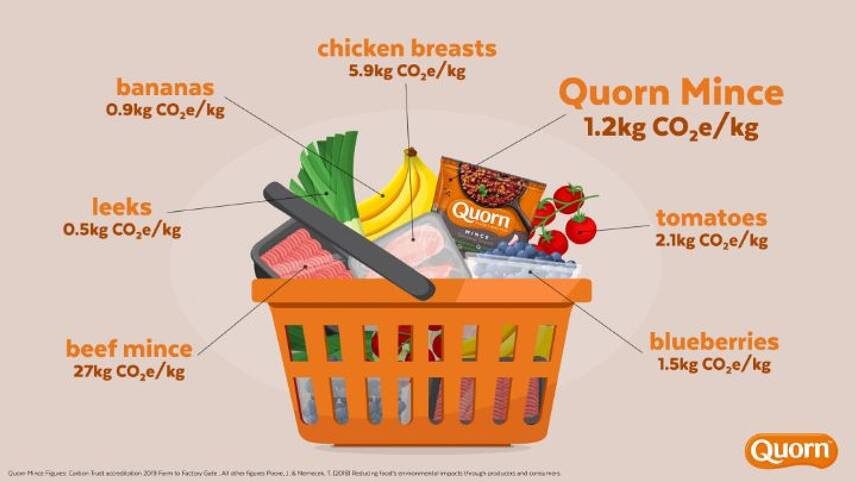Register for free and continue reading
Join our growing army of changemakers and get unlimited access to our premium content

Quorn claims the greenhouse gas (GHG) impact of its Mycoprotein is 90% lower than beef
The new labels will provide carbon emissions data on a “farm to shop” basis and will be rolled out across 60% of the company’s products, by volume, this year. In the interim as new packaging is introduced, Quorn Foods is publishing carbon footprint information on 30 of its products on its website.
In order to ensure the accuracy of the data, Quorn Foods is ascertaining third-party verification from the Carbon Trust. Quorn and The Carbon Trust have been collaborating for several years to research the climate benefits of Mycoprotein compared to beef and, more recently, Quorn became the first major food manufacturer to sign the Carbon Trust’s Climate Leadership Framework. The Framework is designed to help businesses develop a roadmap for reaching net-zero emissions in line with, or, where possible, ahead of, legal deadlines.
Quorn Foods said in a statement that it hopes its decision to introduce carbon footprint labelling without a legal requirement to do so will encourage other brands to follow suit, so that consumers can make better comparisons of the environmental impact of their products.
“This is about giving people the information needed to make informed decisions about the food they eat and the effect it has on our planet’s climate – in the same way that nutrition information is clearly labelled to help inform decisions on health – and we’re asking other brands to get on board with us,” a Quorn Foods spokesperson said.
Why the lag on labelling?
The idea of carbon labelling has been around for some time. As early as 2008, Tesco launched a range of 20 products with the Carbon Trust badged with a Carbon Reduction Label, but dropped it in 2012 after other retailers failed to follow suit.
Since the UK Government introduced its 2050 net-zero target, however – and with citizen climate activism having grown exponentially over the past 12 months – policymakers and businesses alike are beginning to re-float the carbon labelling discussion.
Late last year, Nestle and Premier Foods both revealed that they are considering adding carbon labelling to their products. The companies have both set internal carbon reduction aims – with Premier Foods targeting a 55% absolute footprint reduction by 2025 against a 2018 baseline, and Nestle aiming for net-zero on a global basis by 2050 – and claim labelling could help engage customers with their efforts.
These revelations came after a Carbon Trust survey of 9,000 consumers across seven countries revealed that more than two-thirds would like carbon footprint labelling to be added to products, either on a voluntary or mandatory basis.
Since the survey was conducted, the Danish Government confirmed plans to introduce mandatory carbon footprint labelling for all food products sold through supermarkets. In the run-up to December’s general election, Labour Party members voted in favour of a similar scheme. But the Conservative Party’s manifesto does not mention carbon footprint labelling legislation.
Sarah George


Please login or Register to leave a comment.